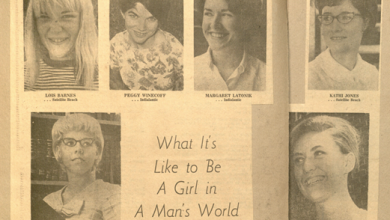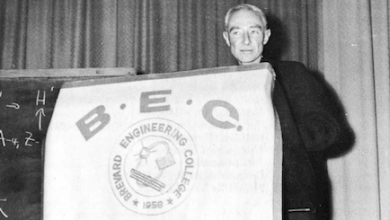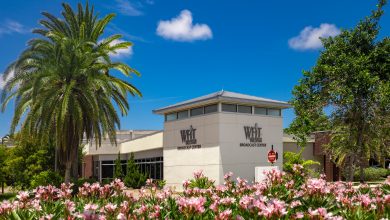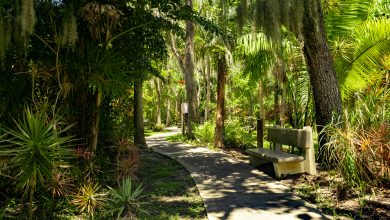The Secret History of Roberts Hall
Dateline: 1970/2020


The building was a problem from the beginning. In 1964, Jerry Keuper had decided to remold “Countdown College” into a residential university. By the late 1960s, more than five hundred students were living on campus. Renting rooms at the airport motel had been a stopgap for the burgeoning student population. The purchase of the Tradewinds Hotel in Indialantic gained the university additional breathing space. The long-term solution, however, was to increase the number of dorm rooms on campus dramatically. Therein, lay the first problem. Where to find the money to finance the construction? In 1969, the university applied for a federal Housing and Urban Development (H.U.D.) grant. Good news came in June 1969, when Congressman Lou Frey announced that H.U.D. had awarded Florida Tech a $900,000 subsidy for the construction of a dormitory to house 250 “male students.” “It’s great news,” Keuper declared. “It’s good for us because we need the facility.” Privately, Keuper grumbled that he was “mildly disappointed” that the H.U.D. award provided only a subsidized lower interest rate and not an outright grant. Ever an optimist, Keuper was confident that the money problem could be solved. However, Keuper had not anticipated the local opposition to the building, a lawsuit that would reach Florida’s Supreme Court, and a host of problems that grew from the building’s innovative construction plan.
The Root of All Evil
Money was a perennial problem at Florida Tech. There was nothing new in this. Keuper’s appetite for expanding the campus was always larger than the available resources. The H.U.D. grant meant that the university could borrow $900,000 at a low-interest rate. The challenge was finding an individual or agency who would purchase the tax-free bonds. Keuper asked Fred Roberts, a university trustee, to make the proposed dormitory a reality. He could not have chosen a better person. During the next three years, Roberts would succeed in raising the needed funds, defend the university in a series of public hearings, hammer out a compromise with an angry citizen’s group, which opposed the school’s expansion, and oversee the building’s construction.
Fred S. Roberts
Fred S. Roberts was one of Florida Tech’s early champions. Born in 1900 in Michigan’s Upper Peninsula, Roberts grew up in sparsely populated Osceola Township in Houghton County. Roberts’ father, Abraham, was a salesman in the town’s general store. His mother, Mary, who had been born in England, encouraged her son’s aspiration to make something of himself. The United States’ entry into World War I allowed Roberts to demonstrate his patriotic zeal and a chance to leave rural Michigan. After securing his parents’ approval, the seventeen-year-old enlisted in the U.S. Army vowing to do his “bit” to bring the Kaiser down. Two years later, with the Kaiser removed from his royal perch, Roberts was honorably discharged from the army. Like many in his generation, he decided not to return home at the war’s end. Instead, he opted to remain in the East, working first as a salesman in a dry goods store and by the mid-1920s as the proprietor of a burgeoning, wholesale automobile part’s company. Roberts would remain in Fairfax, Virginia, near Washington, D.C., for the next thirty years. During World War II, he served on the federal War Production Board’s Office of Price Administration and the War Manpower Commission. In 1952, Roberts retired, moving with his wife Clara to Melbourne, Florida.
The Sewage Wars Begin
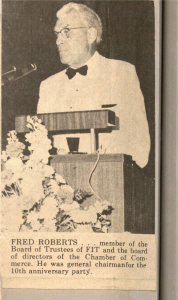
In retrospect, Robert’s service in two World Wars prepared him for the battles he fought in Florida Tech’s behalf. In the 1960s, sanitary engineers for the city of West Melbourne hatched the idea of building a sewage treatment plant along the banks of a tributary of Crane Creek. The engineers planned to flush the city’s sewage effluent into what they prosaically called Dartmouth Ditch, which meandered through the campus where it merged with Crane Creek. Jerry Keuper judged the proposal “unthinkable.” Roberts took the lead in defending the university. “We are very concerned,” he declared. A single misstep at the proposed West Melbourne sewage plant would put the health of the growing student population living on campus adjacent to Crane Creek at risk. “Any run-off, however, minimal would Roberts argued “be dangerous” to the students’ health. Roberts’s reasoning prevailed, and West Melbourne revised its sewage treatment plan.
Crew Comes to Florida Tech

During the sewage fight, Roberts energetically supported the expansion of Florida Tech’s athletic program. One of his priorities was in bringing crew to Florida Tech. In February 1968, Keuper announced that the university had purchased an eight-oar, 65-foot-long shell from Rollins College. Roberts, whose home was adjacent to the Melbourne yacht basin, donated his boathouse and the adjoining property to the university as the home for Florida Tech’s nascent crew program. Nine months later, the Independent Colleges and Universities of Florida (ICUF), named Fred Roberts a “Champion of Higher Education in Florida” in recognition for his service to Florida Tech. Brevard’s County Commissioners acknowledged Roberts’s role in advancing Florida Tech at the university’s tenth anniversary of its founding by proclaiming October 17, 1968, “Fred Roberts Day.” During the celebration, Roberts could not have anticipated how his political savvy and fund-raising talents would be tested in the battle to build the proposed seven-story dormitory on Country Club.
Funding the Dormitory
Initially, everything seemed to be falling into place. In February 1970, the Brevard County Commission created the Brevard Higher Education Authority (BHEA), which could serve as a guarantor for loans made for the construction of facilities for post-secondary colleges and universities. Commissioner Richard Muldrew, whose district encompassed south Brevard, authored the proposal. “FIT. is particularly hard hit,” Muldrew explained, “and begging for money from aerospace corporations. Their financing is short term, with high monthly payments. I think getting this started will open the door to help the school.” The catch was that the BHEA could only stand surety for loans in south Brevard.

Administrators at Brevard Junior College howled when they learned of their exclusion. They objected, arguing that the BHEA was supporting a private institution. Citizens in North Brevard joined the chorus. Muldrew was “charged with favoritism” for his cronies at Florida Tech. Fearing a hostile lawsuit that might tie the university up in years of litigation, Keuper, Roberts, and the Board of Trustees crafted a “friendly” lawsuit, which they believed would establish the constitutionality of the county commission’s ordinance creating the BHEA. In the next eighteen months, the suit would make its way through the legal system to the state supreme court. In April 1971, the high court ruled that the county commission’s actions were constitutional.
Zoning Issues
While the lawsuit was winding its way to Tallahassee, Roberts and the university became embroiled in fight closer to home. Florida Tech’s neighbors objected to the university’s expansion. The school’s neighbors objected to what they considered the students’ raucous behavior. They argued that Florida Tech had shown a flagrant disregard of Melbourne’s zoning ordinances. The citizens’ initial objection was to the creation of a student parking lot on the west side of Country Club. The announcement that F.I.T. planned to build a seven-story dormitory adjacent to the parking lot led to the organization of “Neighbors of FIT” seeking to block the school’s expansion.

Ann Beck, a representative of Melbourne’s engineering department, confirmed the Neighbors of FIT’s charges. The parking lot violated the city’s code. Moreover, Brownlie Hall, the university’s first dormitory, was also in violation of the zoning code. When confronted with the Brownlie Hall code violations, Keuper’s response was, “I don’t know about that.” As for the parking lot, Keuper sheepishly added: “we stopped when we found out we were in violation.”

Roberts to the Rescue

Fred Roberts’s persuasiveness and political connections allowed F.I.T. to dodge the zoning controversy. In 1969, the city governments of Melbourne and Eau Gallie merged. Roberts had played an active role in the campaign leading to the cities’ unification. In the process, he had developed strong ties with the newly formed Harbor City (Melbourne) Council. Roberts succeeded in convincing the council to refer the question to the reconstituted City Zoning Commission. The Neighbors of FIT argued that the Commission was not impartial. Lansing Gleason, a longtime booster for “Countdown College, was the Commission’s chair. Another member, Gene Fetner, had worked with Keuper at R.C.A. at the Missile Test Project and was a part-time math instructor at F.I.T. In an effort to dampen the Neighbors of FIT’s charge of cronyism, both men recused themselves from the discussion during Roberts’s presentation of Florida Tech at the hearing.

Behind the scenes, Roberts quietly opened discussions with the Neighbors of FIT. e believed that the dispute could be amicably resolved. In the negotiations, Roberts proposed a set-aside between the parking lot and the adjacent homes. The homeowners demanded fifty feet. The give-and-take went on weeks. In the end, Roberts succeeded in cajoling the Neighbors of FIT into accepting a twenty-five-foot buffer and to drop their opposition to the dormitory’s construction. The resolution of the zoning controversy and the Florida Supreme Court’s ruling on the constitutionality of state support for a private university assured both the legality and ultimate success of Florida Tech’s raising one million dollars through the sale of bonds backed by the Brevard Higher Education Authority.
Sewage Wars Redux
A final, odiferous obstacle necessitated Roberts final intervention in the university’s behalf. As the zoning dispute raged, an enterprising city accountant discovered that Florida Tech had failed to pay $15,000 in its sewer tax assessment. Keuper asked Roberts to find an amicable, affordable settlement for the delinquent fees. Roberts appeared before the Melbourne City Council and argued the university should not have to pay the assessment. He pointed to a recent agreement between the city and a group of doctors who had donated land to the city and received an exemption. Roberts argued that a similar agreement should be made with Florida Tech noting the college’s donation to the city of property along Country Club Road. He promised that in the future the university would pay its sewage assessment. An agreement was reached.
The Building
In April 1970, calls for bids for the construction of the seven-story dormitory went out. The building’s architects proposed an innovative construction plan. “There isn’t a single building,” Ernie Briel, who led the building’s design, declared, “of this type in east-central Florida.” Briel planned to use a “lift slab” concrete construction technique that was described “as unique as the space age institute itself.” A local reporter likened the process of making a building “like a stack of bread slices.”
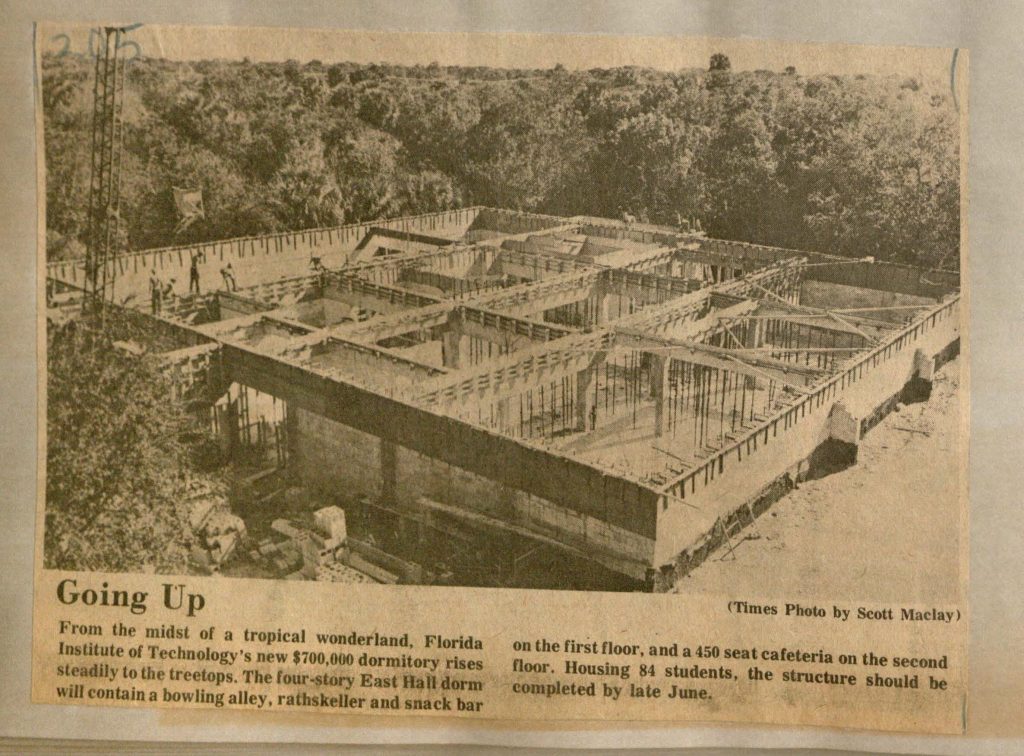
Construction began in January 1971. As was often the case at Countdown College, the work advanced with “fits and starts.” A year passed before the dormitory’s completion. In the interim, the university devised a “computer-based” roommate selection plan to guide the room assignments. Robert Brown, director of Florida Tech’s newly formed computer center, prepared a program based on answers to a half dozen questions. (Are you a smoker? An introvert or extrovert? Perfectionist? Night owl? Neat or Messy? Do you ride a bike or motorcycle?)
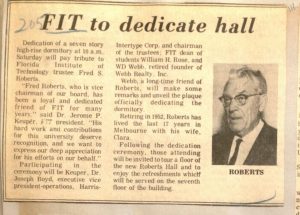
In June 1972, Jerry Keuper welcomed guests to the seven-story dormitory’s dedication. It had taken three years to make the building a reality. The building would be named Roberts Hall. “Fred Roberts, who is vice chairman of our board,” Jerry Keuper explained, “has been a loyal and dedicated friend of FIT for many years. His hard work and contributions to this university deserve recognition, and we want to express our deep appreciation for his efforts on our behalf.” It was a fitting tribute.
Excreta Über Alles
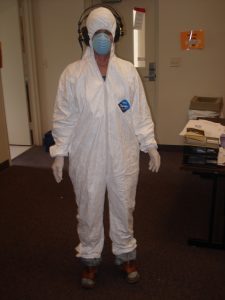
Fred Roberts, who died in 1976, did not live to see the latest installment in Florida Tech’s epic sewage wars. Shortly before dawn on Tuesday, September 11, 2007, workers refurbishing the sewage line running along Country Club Road inadvertently caused a backup which led to a pool of “three inches of diluted sewage” to form in the first floor of Roberts Hall. Initially, the contractor told Greg Tsark, then the university’s vice president of facilities operations, that the sewage backup was an “act of God.” A bystander observed that at Florida Tech “God moves in strange ways.”
Postscript: On July 14, 2019, Roberts Hall closed to allow for the installation of a new HVAC system. Student complaints about the building’s erratic air conditioning necessitated the closure. Work refurbishing Roberts Hall remains incomplete as of May 2020. Fred Roberts would have approved. In 1972, when Roberts and his wife Clara learned that there were no plans to air-condition the building, they donated the money needed for an AC system. At the time, Roberts noted that members of Florida Tech’s crew team would live in the dormitory. He told Melbourne Times columnist, Homer Pyle, that “the cooler the crew the faster they’ll row.”

Note: Nancy Grossbart. who oversaw the publication of the Secret History, is retiring from the university. I wish to express my thanks to Nancy for her years of service at Countdown College and for her help with the Secret History. Her attention to detail, probing questions, and patience will be missed. Happy Trails, Nancy.



